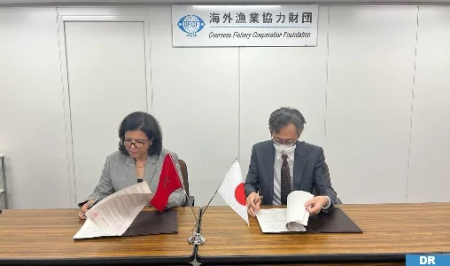Morocco looks forward to expanding and diversifying its aquaculture activities in coastal villages with a view to give a new momentum to its “blue economy.”
To achieve this goal, the North African Kingdom wants to benefit from Japan’s advanced experience in aquafarming and scientific research in this industry.
The two countries have agreed on a three-year cooperation program starting 2023 during the 37th annual consultation meeting, provided for in the fisheries agreement signed between Morocco and Japan in September 1985.
The two parties also agreed on several technical and financial provisions, as well as on the fishing modalities for Japanese vessels operating in the tuna longline fishery in Moroccan waters, during the 2023 fiscal year.
The two parties took stock of cooperation projects currently underway in Morocco, notably the “Souiria Kdima” new-generation fishing village project, the aquaculture development project for blue growth in Morocco, and the assignment of a long-term Japanese expert.
They likewise stressed the importance of partnership between private operators from both countries, and convened to promote and encourage this partnership in the field of maritime fisheries and related activities.
The Moroccan side insisted on the need to resume tripartite Moroccan-Japanese-African cooperation in the fisheries sector, which benefits all partners.
Moroccan-Japanese cooperation in maritime fisheries dates back to over 40 years, focusing on aquaculture research, training, fishing villages…
Aquaculture in Morocco dates back to 1950 with the launch of Oyster farming Oualidia lagoon. Intensive farms were then developed in 1985 on the Mediterranean coast in Nador and M’diq. Production was essentially focused on European sea-bass, Gilt-headed bream, and oysters.
Ten years later, shrimp farming was introduced at Moulouya river, while shellfish farming (bivalve shells) was launched in 2000 at Dakhla Bay. The sector gained momentum thanks to the Halieutis plan deployed to bolster performance and production of fisheries and aquaculture.
